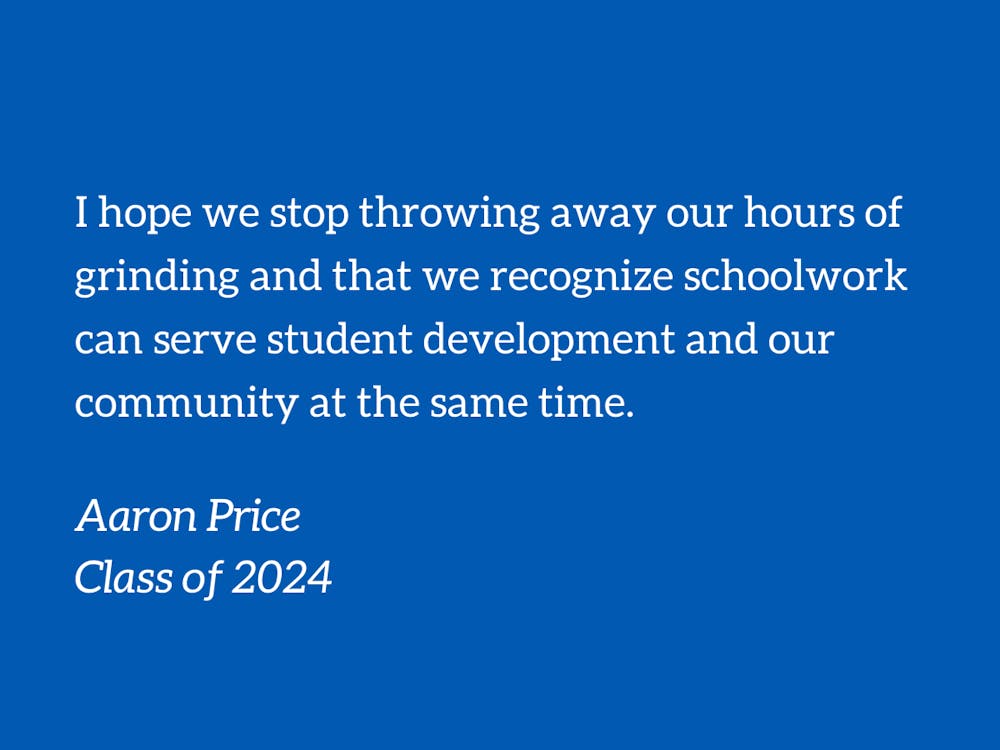You know that feeling when you work really hard on an assignment? You stay up late and wake up early. You diligently spend hours in the Gothic Reading Room reading and re-reading your writing, checking the logic of your algorithm or crafting that perfectly persuasive memo. And then you submit it and get a grade back. It’s an “A” and you’re stoked. Then the high wears off. You take back the paper and you admire the grade one last time. Then, you throw it in the trash or never open the document tab again.
This is how school works. Since kindergarten, we have poured hours into completing assignments to develop as learners. But, once those assignments are finished, they’re never touched again. Hundreds if not thousands of essays, math sheets and coding projects all destined for the physical or digital trash. That’s school. But, what if it doesn’t have to be?
What if our assignments were destined not for the landfill but for use by our local community? This would be wildly beneficial to students, community members and the relationship between Duke and Durham. I realize this isn’t possible in every class — but what if we at least considered it as we designed syllabi?
We are already doing this in some classes. In EGR101, companies and organizations pitch different engineering challenges they are facing. The students, mainly freshmen, then spend the semester moving through the engineering design process to create solutions.
The Duke Club Ski and Snowboard Team was one of the organizations pitching a project last semester. With our lack of snow in Durham, the team didn’t have the ability to train without traveling. So, an EGR101 team built a portable and artificial ski slope for them. The student engineers got to work with real users and the skiers ended up receiving a product that enables them to practice their sport on campus. A true win-win.
Real work doesn’t have to be limited to EGR101. Marketing classes could help local businesses with their branding, computer science students could design software to automate tedious workflows for non-profits and journalism students could share the stories and history of Durham through their coursework.
Duke students would get the chance to feel more connected to their assignments. There’s nothing more special than working diligently on something and then seeing it being used in the world. We would develop portfolios of real projects and get to work with real stakeholders — with all of the nuance, feedback and learning that comes from that.
Durham would get the extra hands and expertise of Duke students, saving them time and money while increasing the impact they are able to have. Many of these local nonprofits and organizations can’t afford to spend tens of thousands of dollars on a new website, don’t have the bandwidth to explore new opportunities or can’t access Duke’s resources to be on top of cutting-edge research. Duke students serving their communities through their classwork would unlock these opportunities for them.
And this would all serve to strengthen the bond between Duke and Durham in a way where students are supporting the community rather than just venturing into the city to play. This would spark dialogue and understanding between Duke and Durham and align with the goals of the Board of Trustees Strategic Task Force.
I recognize that initiating this real world work would require significant time and resources to build relationships with partner organizations. But, I think the benefits to students, Durham and the relationship between the university and community outweigh the costs.
Students at Duke try really hard. I hope we start to recognize the missed opportunity of not applying our learning through real work. I hope we stop throwing away our hours of grinding and that we recognize schoolwork can serve student development and our community at the same time. Duke has the chance to empower students through solving real problems, help our Durham community and strengthen the relationship between our school and the city. I really hope we decide to take it.
Aaron Price is a Trinity senior. His column typically runs on alternate Tuesdays.
Get The Chronicle straight to your inbox
Sign up for our weekly newsletter. Cancel at any time.

